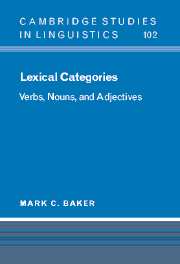Book contents
- Frontmatter
- Contents
- Acknowledgements
- List of abbreviations
- 1 The problem of the lexical categories
- 2 Verbs as licensers of subjects
- 3 Nouns as bearers of a referential index
- 4 Adjectives as neither nouns nor verbs
- 5 Lexical categories and the nature of the grammar
- Appendix Adpositions as functional categories
- References
- Index
1 - The problem of the lexical categories
Published online by Cambridge University Press: 06 January 2010
- Frontmatter
- Contents
- Acknowledgements
- List of abbreviations
- 1 The problem of the lexical categories
- 2 Verbs as licensers of subjects
- 3 Nouns as bearers of a referential index
- 4 Adjectives as neither nouns nor verbs
- 5 Lexical categories and the nature of the grammar
- Appendix Adpositions as functional categories
- References
- Index
Summary
A theoretical lacuna
It is ironic that the first thing one learns can be the last thing one understands. The division of words into distinct categories or “parts of speech” is one of the oldest linguistic discoveries, with a continuous tradition going back at least to the Téchnē grammatikē of Dionysius Thrax (c. 100 BC) (Robins 1989: 39). Dionysius recognized that some words (ónoma, alias nouns) inflected for case, whereas others (rhēma, alias verbs) inflected for tense and person. This morphological distinction was correlated with the fact that the nouns signified “concrete or abstract entities” and the verbs signified “an activity or process performed or undergone.” The historical precedence of this linguistic insight is often recapitulated in contemporary education: often when students enter their first linguistics class, one of the few things they know about grammar is that some words are nouns, others are verbs, and others are adjectives. Linguistics classes teach them many fascinating things that go far beyond these basic category distinctions. But when those classes are all over, students often know little more about what it means to be a noun, verb, or adjective than they did at first, or indeed than Dionysius did. At least that was true of my education, and of the way that I learned to educate others.
For many years, most of what the Principles and Parameters (P&P) tradition of Generative Syntax has had to say about the lexical categories is that they are distinguished by having different values for the two binary distinctive features +/−N and +/−V in the following way (Chomsky 1970).
Information
- Type
- Chapter
- Information
- Lexical CategoriesVerbs, Nouns and Adjectives, pp. 1 - 22Publisher: Cambridge University PressPrint publication year: 2003
Accessibility standard: Unknown
Why this information is here
This section outlines the accessibility features of this content - including support for screen readers, full keyboard navigation and high-contrast display options. This may not be relevant for you.Accessibility Information
- 1
- Cited by
